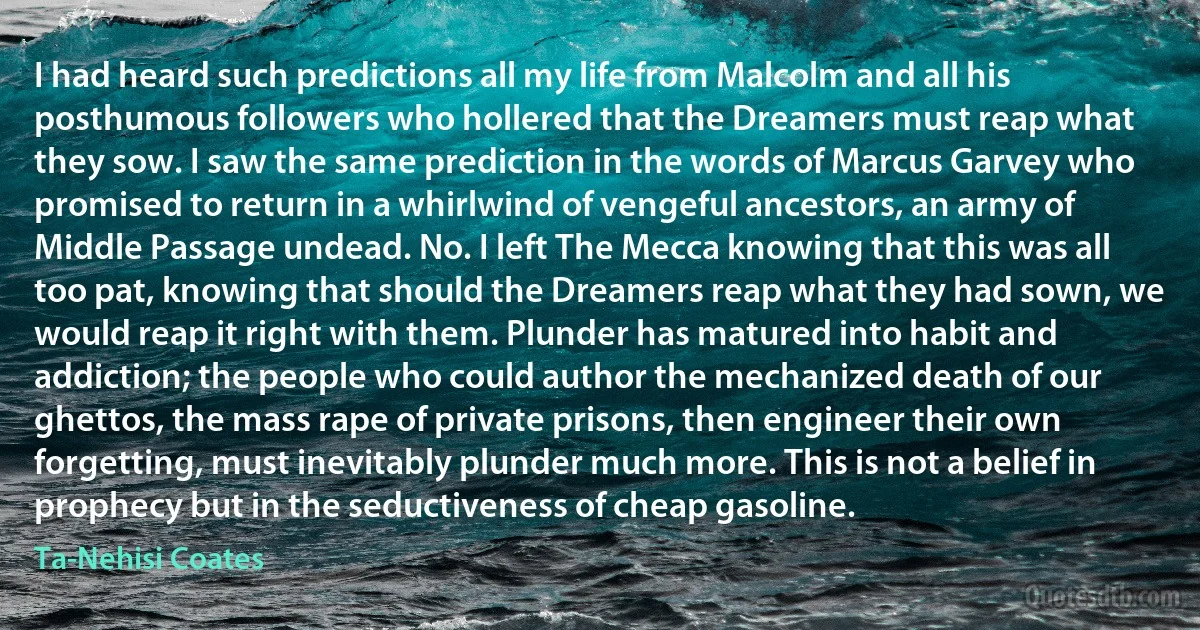Private Quotes - page 96
Nature has poured forth all things for the common use of all men. And God has ordained that all things should be produced that there might be food in common for all, and that the earth should be in the common possession of all. Nature created common rights, but usurpation has transformed them into private rights.

Ambrose
Agreeably to the request of the House of Representatives, communicated in their resolution of the 16th instant, I proceed to state under the reserve therein expressed, information received touching an illegal combination of private individuals against the peace and safety of the Union, and a military expedition planned by them against the territories of a power in amity with the United States, with the measures I have pursued for suppressing the same....

Thomas Jefferson
The experience that was had in ... the taking away of private property, and the possession of it in community, by a commonwealth ... was found to breed much confusion and discontent; and retard much employment which would have been to the general benefit.... For the young men that were most able and fit for labor and service objected that they should spend their time and strength to work for other men's wives and children, without any recompense.... The strong man or the resourceful man had no more share of food, clothes, etc., than the weak man who was not able to do a quarter the other could; this was thought injustice. The aged and graver men, who were ranked and equalized in labor, food, clothes, etc., with the meaner and younger ones, thought it some indignity and disrespect to them.

William Bradford (1590-1657)
The pivot round which the religious life... revolves, is the interest of the individual in his private personal destiny. Religion, in short, is a monumental chapter in the history of human egotism. The gods believed in-whether by crude savages or by men disciplined intellectually-agree with each other in recognizing personal calls. Religious thought is carried on in terms of personality, this being, in the world of religion, the one fundamental fact. To-day, quite as much as at any previous age, the religious individual tells you that the divine meets him on the basis of his personal concerns.

William James
The prevailing opinion at court was that the founding of a colony was beyond the strength of the Sovereign of a small state and that he would swallow up his private fortune, unable to create anything lasting. The King sought for the execution of his designs collaborators possessed of the faith which he himself had and which lifts mountains.

Leopold II of Belgium
The probity that scintillizes in the superfices of your persons informs my ratiocinating faculty, in a most stupendous manner, of the radiant virtues latent within the precious caskets and ventricles of your minds. For, contemplating the mellifluous suavity of your thrice discreet reverences, it is impossible not to be persuaded with facility that neither your affections nor your intellects are vitiated with any defect or privation of liberal and exalted sciences. Far from it, all must judge that in you are lodged a cornucopia and encyclopaedia, an unmeasurable profundity of knowledge in the most peregrine and sublime disciplines, so frequently the admiration, and so rarely the concomitants of the imperite vulgar. This gently compels me, who in preceding times indefatigably kept my private affections absolutely subjugated, to condescend to make my application to you in the trivial phrase of the plebeian world, and assure you that you are well, more than most heartily welcome.

François Rabelais
As Lavoisier was from the first accused by the English chemists of having acted unfairly toward them, and as indeed his own claim only dates back to June 25, 1783, he may be dismissed from further consideration; and during the lives of the English claimants there were no public complaints on either side, although Watt, in private letters to his friends, hinted at Cavendish's incapacity and unfairness.

Henry Cavendish
In terms of his personal characteristics, Hayek was a very complicated personality. He was by no means a simple person. He was very outgoing in one sense but at the same time very private. He did not like criticism, but he never showed that he didn't like criticism. His attitude under criticism, as I found, was to say: "Well, that's a very interesting thing. At the moment, I'm busy, but I'll write to you about it more later." And then he never would! On the other hand, he wasn't like von Mises. He wasn't intolerant at all. You cannot conceive of Hayek doing the kind of thing that Mises did, when, for example, he wouldn't talk to Machlup for three years because Machlup had come out for floating exchange rates at a Mont Pelerin meeting. Hayek did not do that. That was, I believe, because of the influence of the London School on him. He was very much tempered by the London School.

Friedrich Hayek
What is the price, we ask the other side? What is the price that you want from these working men and women? What cost? How much more do we have to give to the private sector and to business? How many billion dollars more, are you asking, are you requiring? When does the greed stop, we ask the other side? That's the question and that's the issue.

Ted Kennedy
If anything were required to convert me to the need for Scottish Home Rule, I think it was that solitary experience I had upon a Private Bill Committee... [P]urely local, and if I may say purely provincial questions ought to be delegated to purely provincial and-I am not afraid to use the word-national assemblies.

David Lloyd George
I have been in favour of all men who believe in the principle upon which our prosperity has been built-free, private enterprise-of men who are opposed to revolutionary proposals, and who are equally opposed to reactionary proposals, because, believe me, they are only the reverse of the same medal, acting together for the purpose of bearing the country through the gigantic difficulties which have been left as an inheritance by the war.

David Lloyd George
Toryism would confiscate, in the interests of a private monopoly, the produce of the industry, the toil, the capital, the risk and the effort of others. Socialism would also confiscate, in the interests of a State monopoly, the efforts of the individual. Liberalism stands for a free opportunity for the individual to do the best for himself and the nation.

David Lloyd George
All societies of men must be governed in some way or other. The less they may have of stringent State Government, the more they must have of individual self-government. The less they rely on public law or physical force, the more they must rely on private moral restraint. Men, in a word, must necessarily be controlled, either by a power within them, or by a power without them; either by the Word of God, or by the strong arm of man; either by the Bible, or by the bayonet. It may do for other countries and other governments to talk about the State supporting religion. Here, under our own free institutions, it is Religion which must support the State.

Robert Charles Winthrop
It is truly a marvelous thing to consider to what greatness Athens arrived in the space of one hundred years after she freed herself from the tyranny of Pisistratus; but, above all, it is even more marvelous to consider the greatness Rome reached when she freed herself from her kings. The reason is easy to understand, for it is the common good and not private gain that makes cities great. Yet, without a doubt, this common good is observed only in republics, for in them everything that promotes it is practised, and however much damage it does to this or that private individual, those who benefit from the said common good are so numerous that they are able to advance in spite of the inclination of the few citizens who are oppressed by it.

Niccolò Machiavelli
Achieving a democratic and equitable international order requires overcoming formidable obstacles, including the wrong priorities by governments and international organizations, bias in favour of civil and political rights over economic, social and cultural rights, the prevailing demophobia in many countries, where governments refuse to listen to their citizens and ban referenda, the curses of positivism, selectivity and double-standards, the tendency to go for short-term solutions instead of addressing root causes, the continued existence of secrecy jurisdictions, the impunity of transnational corporations and other private sector actors, and, of course, institutional inertia.

Alfred de Zayas
From scandalous beginning to tormented end, theirs was the most epic love story in Hollywood history: a blaze of headlines, booze, jewels, brawls, and private jets. Marrying and divorcing twice, Elizabeth Taylor and Richard Burton rocked the culture and each other's lives with a passion that reverberated long after Burton's 1984 death.

Richard Burton
Even if the days of 1928 and early 1929 could be brought back again, the economic situation would be utterly indefensible on moral grounds. The greedy scramble for private gain and special privilege, the gambling spirit and the ruthless determination to gain wealth by means fair and foul, the callous indifference to how the other half lived or at most the throwing of a few crumbs of philanthropy, the bitter exploitation of the weak and the brutal suppression of the workers as they attempted to organize in defense of their minimum rights, the cruel assumption that there must always be a wide gulf between the rich and the poor, the willingness to send unnumbered victims to their doom on the battlefield in defense of vested interests-all these and countless other evils are inherent in the economic order which held sway in 1929. God forbid that we should have any desire to return to that living hell!

Kirby Page
My private life has been the subject of much jabbering. Perhaps this slightly scandalous side of me people find entertaining! Before, being a model, it was just a job, and I was making fun of it. But today, I take my career more seriously. The fact that a reader may buy an Armani item because she'd seen it on me in a magazine is very important to me. So much so that I intend to launch my own label.

Milla Jovovich
One day in 1926 I met him at the gate of the British Museum in his private is uniform. «Hullo, Lawrence.» «Do you recognize me?» «Of course.» Then he said, «The whole afternoon i have been walking about the Museum where every attendant used to know me, and not a single one recognized me, till I inquired about someone I missed. Then the man knew me.» Quise so - what was the good of disguising if no one recognized him?

T. E. Lawrence



